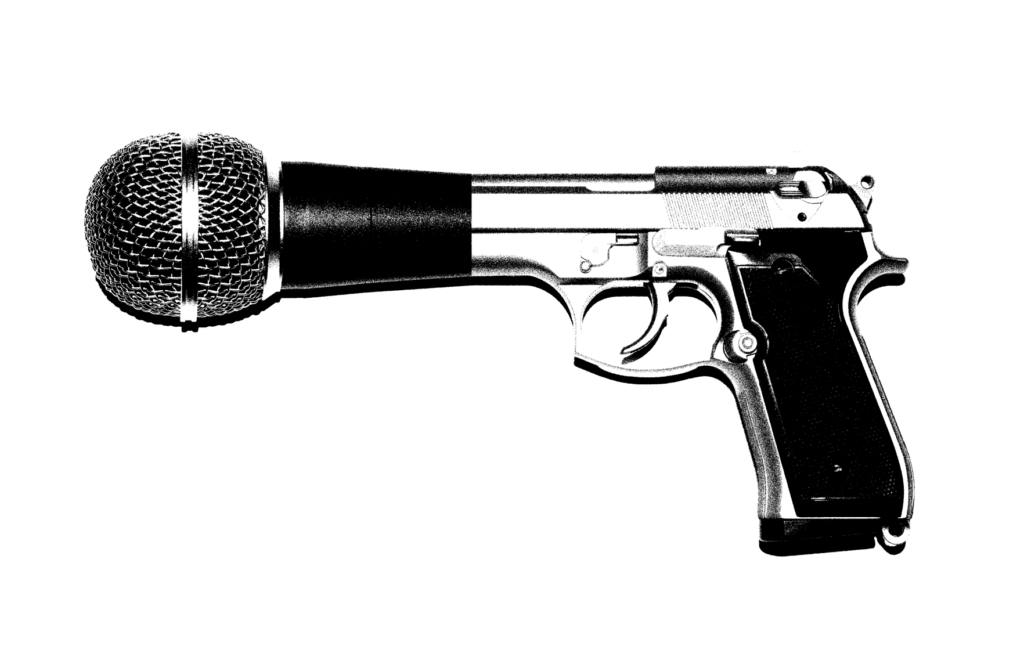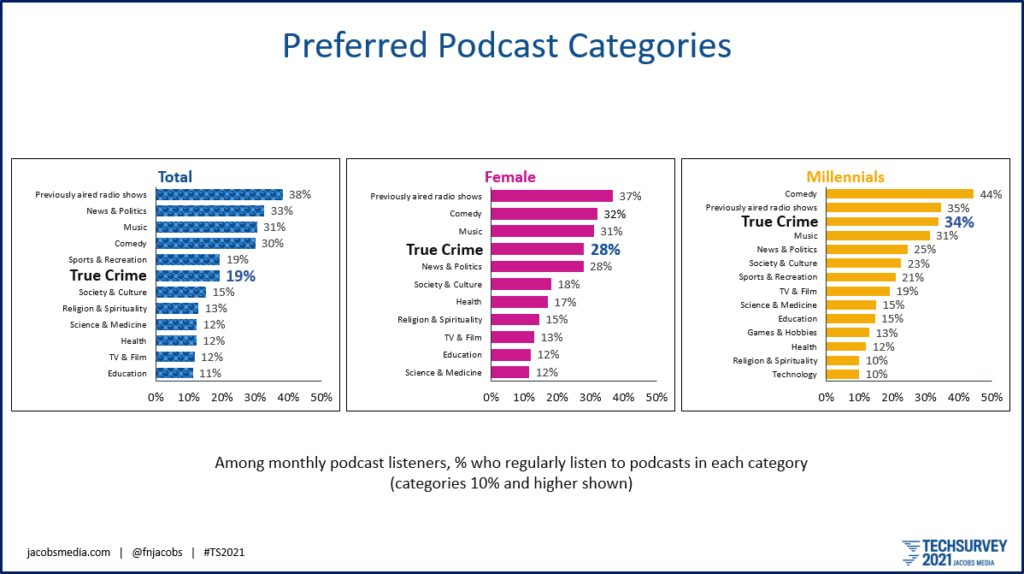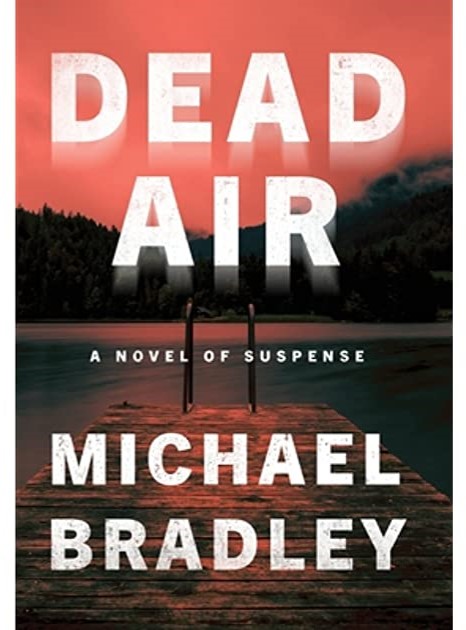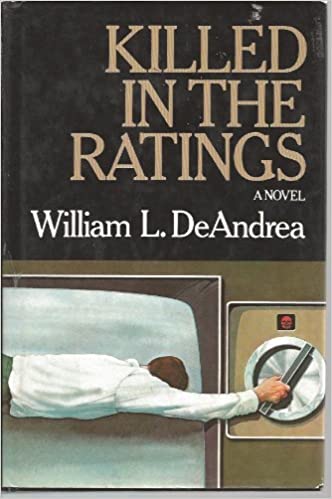
I’m always amused when someone tell me they’re not “into” podcasts. It is true most podcasts are “spoken word,” and some people don’t enjoy listening to talk. But the fact is, podcasts are about everything. You name it, and chances are there’s a podcast – or a dozen of them – on the topic.
You see it up close and personal at events like Podcast Movement where enthusiasts from all over the planet debate whether “podcast” is, in fact, a good name or a bad name for the medium, (my favorite) what is the ideal length for a podcast, or is anybody making money on podcasts?
The remarkable thing about gatherings of podcasters is how diverse they are. You run into people producing shows about cannabis, woodworking, quilting, politics, surfing, and…podcasts.
The last few years in Techsurvey, we’ve developed a list of podcast genres in order to get a fix on the most popular ones. We then crosstab this information by key demographic groups (gender, ethnicity, age), as well as by their format preferences. In this way, programmers, producers, and digital directors can get a better understanding of what resonates in the podcast space among their core audience.
One of the genres that has become a staple in the podcast ecosystem is True Crime. In focus groups I’ve conducted over the past few years in both commercial and public radio settings, I continue to hear about the popularity of this category – especially among women and Millennials. So, we started to quantify these findings, and sure enough, that’s exactly how it stacks up.

True Crime is a popular genre across the board (tied for fifth overall), but as the focus groups tipped us off, its appeal skews female and young. Maybe it’s no surprise that women are intricately involved in some of podcasting’s biggest hits in this category. That includes My Favorite Murder, produced and hosted by Karen Kilgariff and Georgia Hardstark. And let’s not forget the podcast that may have fueled the current renaissance – Serial – is a “True Crime” masterpiece headed up by Sarah Koenig.
And now, there’s some buzz that a radio station might be a perfect location for a True Crime story. That was the sense I got when I saw this James Cridland tweet:
Is the life of a radio DJ perfect for true-crime? https://t.co/Oq9F1bjaX5
— James Cridland (@JamesCridland) June 11, 2021
While it might be jumping the gun to point the finger at Dr. Johnny Fever (who I’m sure had a great alibi), the tweet links a story in CrimeReads by Michael Bradley titled “Why The Life Of A Radio DJ Is Perfectly Suited To Crime.”
It turns out Bradley is a former DJ turned suspense novelist. His heroine is a radio star, Kaitlyn Ashe (sounds like an air name to me), and the book is appropriately titled, Dead Air. 
Bradley notes that a radio station at night is the perfect location for an True Crime suspenseful scenario. After the salespeople go home and the cleaning crew has come and gone, it’s just a DJ, a studio, and the phone lines. Anything can happen (assuming the station isn’t voicetracked that is).
Bradley may be onto something here, and Kaitlyn could become an ongoing character, anchoring a series of creepy stories revolving around a radio station. Just imagine the suspense and drama when:
- The consultant comes to town unannounced
- A listener drops off a cake, but the entire airstaff is too terrified to try a piece
- The ratings book comes out
- The corporate lawyer starts approving every promotion, raising suspicions she’s being impersonated by an imposter
- The morning guy mysteriously doesn’t show up for his show
- Food mysteriously disappears from the kitchen refrigerator
- The general manager is kidnapped, but the station can’t pay the ransom until Q3
- The station mysteriously goes off the air, the backup transmitter fails to go on – an obvious case of engineering sabotage
- A suspicion there’s a ghost in the station, responsible for a long list of disasters, failures, and missteps (I know several of these)
Michael, you’re right – radio is a very scary place, especially these days. Better leave the lights on (assuming we’ve run enough spots to pay the bills).
Who knows? Maybe Clue will replace that dated conservatory with a radio studio.
A postscript…
Michael Bradley may be clever, but he was not the first. Years ago when I was programing WRIF, a radio/college friend, Sheila Sorvari, bought me a book for my birthday with the greatest title ever. As you can see at right, the cover art is pretty compelling, too.
book for my birthday with the greatest title ever. As you can see at right, the cover art is pretty compelling, too.
Even though it’s about a TV executive who gets murdered (who would even dream up such a thing?), Killed In The Ratings by William DeAndrea occupied a prominent place on my bookshelf for many years. The cover art, as they say, is to die for.
The story is centered around network executive Matt Cobb who has to solve a crime the cops want to pin on him. Holy Nielsen! The ratings may contain a clue to the murder.
This is exciting news for the radio broadcasting industry. It’s nice to be talked about – even in felonious terms.
After all, for many of us, radio has always been a mystery.
If you decide to dig into Michael Bradley’s book, you’ll get no spoiler alerts from me.
But just remember the classic solution to most radio crimes:
The consultant did it.
If you’re so inclined, here’s a link to Dead Air.
- Media And Technology In 2025: Believe It Or Not! - April 18, 2025
- In Radio, You Just Never Know - April 17, 2025
- The Secret To Making A Great Podcast (And Great Radio) - April 16, 2025




If the crime scene is a radio station and requires an overnight DJ the crime-rate is down drastically…Radio stations are also very safe places on weekends…lol
Yes, sad but true.
Ages ago when I had a column in Radio World Newspaper, I wondered in print what it must be like for the overnight guy who worked at the Maine radio station owned by author Stephen King (the present day WKIT-FM).
Plain vanilla radio stations are creepy enough when there’s no one else in the building at 3 in the morning. But when the walls bleed, records fly across the room, the clock runs backwards and an Exorcist voice can be heard in the monitors, it makes you think you should have taken that factory job in Tennessee instead.
What is this “Overnight DJ” thing you all keep talking about?
I know, aa foreign concept.
I think you’ve got this True Crime thing down, Alan. You can only imagine the disembodied voice calling on the hot line. Wait – it’s the program director.
“(assuming the station isn’t voicetracked that is).”
What if the murder victim is the station itself? In which case all fingers point to the GM. Or even higher up…..
There’s a book here, Max, and you’re the guy to write it.
There’s certainly a great book/movie/podcast/mural possibility here with “Haunted Radio”. It would be fascinating to read the stories of “cursed” or “haunted” facilities you refer to, Fred and Alan.
Over the years, I’ve been in and out of stations where it sure felt like there was a ghost (or two) in the machine. As I love to say, people come and go, owners come and go, but sometimes it’s just “in the walls.” Thanks, Dave.
Ok, if there was a hint of doubt that I have radio DNA coursing through my blood–and there wasn’t–I now know that to be the case with even more certainty. Michael Bradley writes that “working the Saturday overnight shift was about as boring as reading a poetry book written by a third grader, or just reading poetry in general.” He also wrote of his shift taking place “in a darkened radio station and a claustrophobic broadcast studio.”
I remember that Saturday overnight shift well! It’s where I started. Midnight to 2AM was music, followed by four hours of public affairs and some specialty programs…and I LOVED EVERY MINUTE! I loved threading the programs on the reels with “one fell swoop”–as no doubt many readers can relate–and I loved making a “perfect break” on the air, even if it was just keeping the levels good, playing some spots, and hitting jingle and the next program–and no one was listening. And claustrophobic? Never for a moment. A happy fish who found his happy fishbowl for me!
And I’d go back–crime risk and all–in a moment.
Radio stations may be scary at that hour – at least as far as a “true crime” story is concerned, but after hours/weekends were my favorite times to be in the building, especially the air studio. Thanks, David.